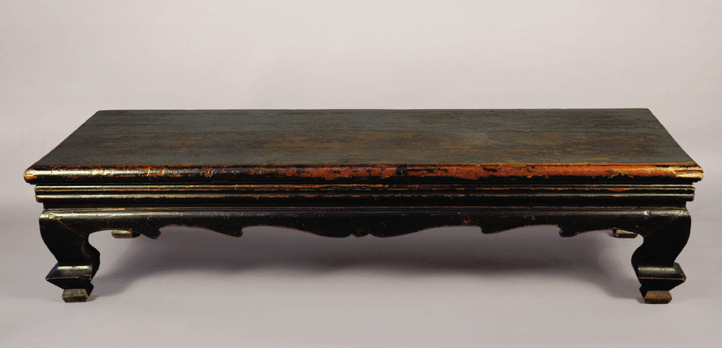 16th/17th C, Sophora, Shanxi. Considered “honorific seat”; of extinct Sophora wood, elegantly styled; 15½” h. 69” w. 28½” d
16th/17th C, Sophora, Shanxi. Considered “honorific seat”; of extinct Sophora wood, elegantly styled; 15½” h. 69” w. 28½” d
In China, as far back as Tang and Song Dynasties, low platforms were recorded to be used as honorific seats. Scholarly gentlemen would relax on them on woven mats, sometimes leaning on a pillow form to listen to music, sit on it and read classics or examine works of calligraphy or paintings, used it to display their collection of ancient bronze vessels, or simply enjoy some food and drinks.
This platform bed is constructed in the traditional classical style. The wide top is comprised of two thick planks fitted snugly together, strengthened and perhaps deliberately show off with big iron boss-head nails at the fitting line. (Metal was very expensive at that age). The thick plank has a convex half-round edge with beading at the lower edge. This top juxtaposed a double waist, with the top section showing a protruding double-incense stick molding, while the lower narrow section is plain and recessed. From this waisted section, the all-around apron arches slightly outward, with the lower edge ending in a lively, curvilinear line with a cusp in the middle. It then flows smoothly into very short cabriole legs terminating in graceful “praying mantis” feet resting on round pads. All these features together present a most elegant profile.
This platform bed is quite rare, not only because of its age but also because of its building material. The Sophora is a tree indigenous to Northern China. Due to its extreme slow growth, the wood is very dense; since it also resists insects, deterioration and warping, it was the wood of choice for furniture construction during the Yuan and Ming dynasties. Its constant use, however, caused its demise by the end of the Ming period. So, furniture made of Sophora is commonly attributed to that early era. This tree also has some historical significance as according to the 1961 publication, “Imperial Peking: Seven Centuries of China”, by Lin Yutang, the last Ming Emperor, Tsungcheng, hanged himself on a Sophora tree in 1643, when he realized he was about to lose his kingdom.
This platform bed is all-original and has retained its thick dark lacquer. It survived in excellent condition no doubt due to its dense and moisture-resistant construction material. It is important to know that this wood, once cut for construction, cracks slightly at first but after drying becomes quite stable and never warps, important for a piece of furniture that might need to be moved around. There is no “coffee table” in China. Today, this elegant platform would make a beautiful coffee table, and when paired off with a pair of sleek-looking leather chairs, would give a room a magnificent contemporary look!